Vitamin C, also known as ascorbic acid (AA), reigns supreme as one of the most coveted ingredients in cosmetics. Its well-documented benefits have solidified its status as an essential skincare component.

The Aging Equation
The journey of skin aging is an intricate dance between two processes: intrinsic, driven by the passing of time, and extrinsic, a result of environmental stressors like sun exposure and smoking. This cumulative transformation leads to visible changes such as wrinkles, diminished elasticity, reduced firmness, thinning skin, and the emergence of age spots.
The mechanisms orchestrating skin aging are multifaceted. They range from decreased cellular proliferation and increased degradation of the extracellular matrix (think collagen and elastin) to oxidative stress – a consequence of the precarious balance between rampant free radicals and dwindling natural skin antioxidants. This oxidative stress activates physiological pathways that expedite the outward signs of aging.
Vitamin C: Nature’s Skin Defender
Vitamin C emerges as a prominent player in this skincare saga. It’s the skin’s most abundant natural antioxidant. While most living organisms synthesize this vital vitamin, humans can’t due to the absence of L-gulono-gamalactone oxidase, an essential enzyme for vitamin C production. Thus, we rely on dietary sources like citrus fruits and leafy greens to fill the gap.
Vitamin C takes on a dual role in skincare. Firstly, it acts as a cofactor for enzymes that directly stimulate collagen synthesis while thwarting the overproduction of metalloproteinases, the collagen-degrading culprits. Secondly, studies have shown that Vitamin C inhibits melanin production and exerts an anti-inflammatory effect. This makes it one of the most coveted and highly recommended ingredients for addressing skin aging concerns in beauty clinics.
The Stability Challenge
In various scientific literature, Vitamin C has been hailed for its antioxidant and depigmenting/whitening properties when applied topically. However, its chemical stability has been a persistent challenge. Ascorbic acid, also known as Vitamin C, is recognized in pharmacopeia literature as a physiological antioxidant and a vital co-factor for collagen synthesis. Yet, it presents as colorless crystals or white powder, odorless and bitter, soluble in water but highly susceptible to alteration when exposed to light, air, or moisture.
The formulation with ascorbic acid demands precision and balance. The skin, as the body’s largest interface with external elements, necessitates secure and stable preparations. Achieving this entails active ingredients and adjuvants in effective concentrations, in suitable forms and conditions to minimize product risks.

Over the decades, researchers have tirelessly explored ways to stabilize the elusive ascorbic acid molecule. Technologies such as esterification and encapsulation have yielded various stable forms of Vitamin C. These stabilized iterations ensure a more reliable, pH-compatible active ingredient, optimal for formulation, application, and metabolism. Crucially, they offer proven effectiveness and safety in the right concentrations.
In essence, the effectiveness of Vitamin C, encompassing moisturization, skin brightening, antioxidant protection, corneal layer renewal stimulation, and collagen synthesis, hinges on the sum of several factors. These include the concentration of the active ingredient, the formulation’s pH, its ability to penetrate the skin, and the chemical stability of the Vitamin C form used.
In conclusion, Vitamin C stands as a timeless champion in skincare. Its multifaceted benefits, combined with innovative formulations, make it an indispensable asset in the quest for healthy, youthful skin.
-
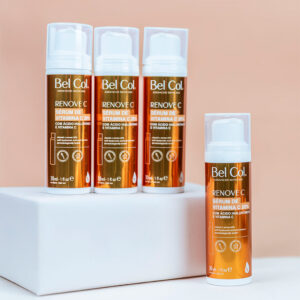 Renove C – Vitamin C 20% Serum – 30mlUS$75.00
Renove C – Vitamin C 20% Serum – 30mlUS$75.00 -
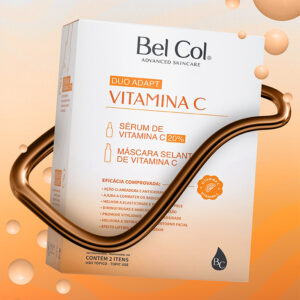 Renove C Box DUO – vitamin c 20% serum + mask – 2 itemsPlease login for prices
Renove C Box DUO – vitamin c 20% serum + mask – 2 itemsPlease login for prices -
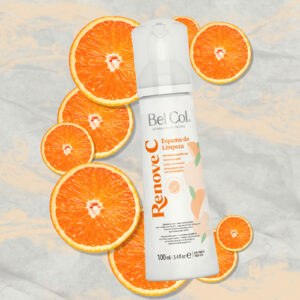 Renove C – foam soap daily use – 100mlUS$26.00
Renove C – foam soap daily use – 100mlUS$26.00 -
 Renove C – gel toner daily use – 120mlUS$25.00
Renove C – gel toner daily use – 120mlUS$25.00 -
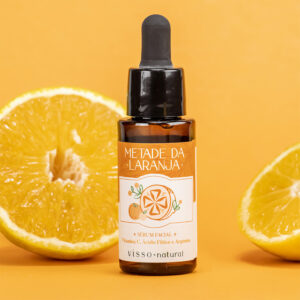 Orange’s Best Half – Vitamin C Serum 30ml – Visso NaturalUS$39.00
Orange’s Best Half – Vitamin C Serum 30ml – Visso NaturalUS$39.00 -
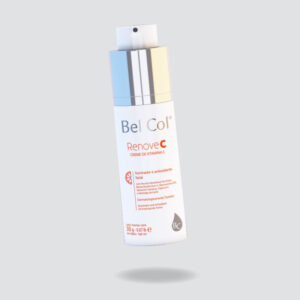 Renove C – Vitamin C Cream – 30gUS$70.20
Renove C – Vitamin C Cream – 30gUS$70.20 -
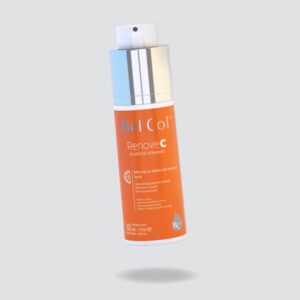 Renove C – Vitamin C Serum – 30mlUS$67.60
Renove C – Vitamin C Serum – 30mlUS$67.60 -
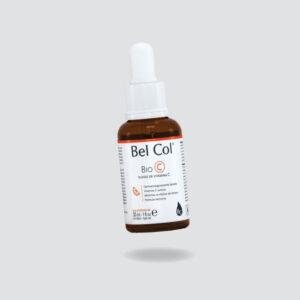 Bio C – vitamin C serum – 30mlPlease login for prices
Bio C – vitamin C serum – 30mlPlease login for prices
